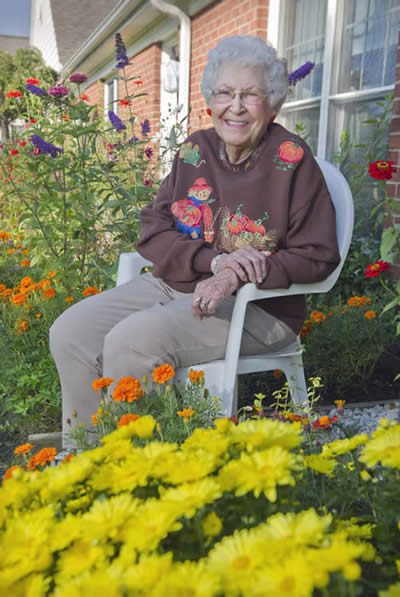
Preserving a farm family’s legacy
As an only child growing up in Lorain County’s Brownhelm Township, Arlene Sahr would pick potatoes, strawberries and other crops at her family’s farm. At 5 a.m. each day, her dad and his brothers would pack the produce in a truck and head to Cleveland’s bustling West Side Market, where there would be plenty of willing buyers for the fresh food.
Sahr, 89, considers herself lucky to have had such a childhood.
“When you are on the farm,” she says with a smile, “it is a good life.”
Sahr, who now lives in Sheffield, has taken steps to ensure that her family’s farm and others like it in northern Ohio are permanently preserved. In 2009, she granted a conservation easement on the 51-acre farm, one that ensures the property will never be developed. In addition, she became a member of the White Oak Legacy Society, a special group of Land Conservancy supporters who have included the organization in their estate planning.
Sahr, who worked as a licensed cosmetologist at shops in Rocky River, Elyria, Amherst and Vermilion, lived most of her adult life in Elyria, but the farm was never far from her mind. After a friend suggested that a conservation easement might be something in which she would be interested, Sahr worked with the Land Conservancy’s Andy McDowell to preserve the farm.
She says she could not be happier knowing the farm will not be developed.
“I didn’t want any more cement or housing,” she says. “This way it will stay preserved, during my lifetime and beyond.”
Sahr says she would love to see the farm, which remains in agricultural production, eventually used for some educational purpose for younger children or teens. A wetlands area on the property has already yielded a bit of history: In 1886, a neighboring farmer unearthed a fossilized mammoth skeleton there. Though most of the skeletal remains have fallen apart over the years due to poor storage conditions, the skull of the mastodon is still on display at the Lorain County MetroParks Carlisle Visitor Center.
Sahr’s farm upbringing has helped her cope with personal tragedies that might have crippled others. Donald Sahr, her husband of 43 years, died in 1985, and two sons passed away in 1989 and 2006.
“I’ve gone through a lot of valleys,” she says, “but that has helped to make the mountains even better. Faith and attitude make a big difference, and I thank God I had such good parents, husband and family. Many people do not have that.”
